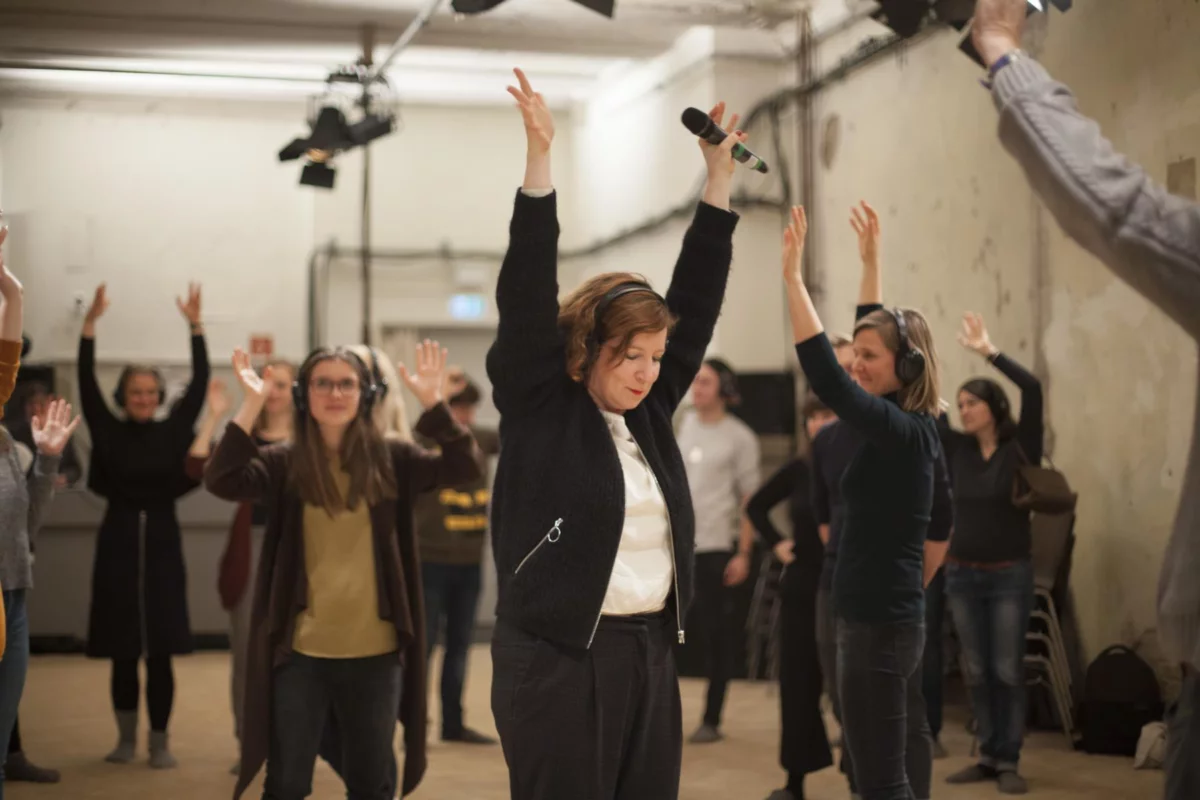Show Attitude
By Georg Kasch
Culture despite the Crisis (Episode 8): Turbo Pascal set out to explore the gray areas of what is acceptable with "Böse Bücher" (Dangerous Books).
What are you still allowed to say today? An astonishing amount. Although you may have to reckon with opposition and sometimes even a shitstorm on social media, one hardly ever encounters actual censorship. Libraries are one example: in the past, there was the “poison cabinet” into which some works disappeared but, today, you can even check out Adolf Hitler's "Mein Kampf," in the critical edition, of course.
How do we define dangerous books? How do we define freedom of expression? When does it reach its limits? These are questions posed by the performance group Turbo Pascal in their current project "Böse Bücher", funded by #TakeAction from the Fonds Darstellende Künste. The multi-award-winning group, known for their participatory formats that often seem friendlier than they are at first glance, came across the topic during a residency at the Pablo Neruda Library in Friedrichshain, Berlin. It was project involving children and librarians, which ended up raising the question of what logic a media collection actually follows. "For example, there was the discussion about Attila Hildmann's vegan cookbooks," says Angela Löer, a founding member of the group. Hildmann is a conspiracy theorist, anti-Semite and right-wing extremist. There is currently a warrant out for his arrest. "Do you remove them from library stock now? Do you put them in a dark corner? Or do you leave them where they are?"
 © Daniela del Pomar
© Daniela del Pomar
Public libraries are a reflection of what people in Germany read. The Spiegel bestseller list is an example. Its titles are prominently displayed. The fact that a book like Thilo Sarrazin's "Deutschland schafft sich ab" (Germany Abolishes Itself) is on the list, may offend many library employees and customers. "But is there any point in removing it from the shelves?" asks Löer. "Is it then really out of sight, out of mind? It’s only what is actually indexed that is then removed from the collection. Are there gray areas?"
With "Böse Bücher," Turbo Pascal follow up on their evening "Böse Häuser" (Dangerous Houses/Houses of Evil). For that, visitors crossed the carpeted floor of the Sophiensæle cafeteria in slippers. Through headphones, they were led in ever new thought monologues into the danger zone of extremes; into religious, neoliberal and ethnic gray areas. Up to what point is something still conceivable and sayable? At what point does it get tricky? And how do visitors react when they realize: I'm not going along with this anymore?
"We've wanted to take these questions further for a while. “What do I label as evil or dangerous? What do I not like to think about?" says Löer. This time, the concept is to equip guests with headphones and send them on a guided tour of the Pablo Neruda Library outside of opening hours, drawing their attention to departments and shelves that they would otherwise hardly engage with. "It would be great if visitors went off afterwards to consider the question: what do I think is a dangerous book?" says Löer. Perhaps this could lead to a separate display table of books, new every evening. Löer finds it interesting to find out what color glasses people are looking through. Are parents trying to protect their children? Do political attitudes become apparent? Or class experiences?
Turbo Pascal always challenges the participants in their projects to take a stand, to show attitude. Sometimes, as in "Dichte Netze" 2020, it is primarily about meeting and exchanging (and, rather marginally, about the question of whether, and how, to talk to right-wingers). Then again, it's about social orders and the exclusion mechanisms of a society based on class, as in "Unterscheidet Euch!", which was invited to the Impulse Festival and Augenblick mal! this year and was awarded the Berlin Children's and Youth Theater Prize IKARUS in 2019.
Even now, Turbo Pascal wants to tempt us to think deeper. The fact that many details are still unclear has something not only to do with the fact that the premiere is not until the end of November. It also has to do with the stress of the corona pandemic. "I'm really exhausted," says Löer. After a short break in April 2020, things soon resumed. Many productions were rescheduled or readapted to be staged online, others postponed. "We didn't cancel anything, always following the motto: we can do it," Löer says. "But it was at the expense of our strength." Vacations were shortened or canceled, production schedules were extended due to postponements and digitization processes. So far this year alone, the Mannheim-based online version of "Unterscheidet Euch!" and "Kein Blatt vorm Mund" in both digital and analog versions, and the Berlin-based four-part zoom series "Irgendwie Mitte", have been produced. "Now all the premieres are getting in each other's way and they can often only play for a short time. That's not sustainable."
This is another reason why Turbo Pascal is considering developing a kind of audio walk from the material after the live premiere at the Pablo Neruda Library – so that the months of preparatory work for "Böse Bücher" don't disappear into the archive after just a few performances. Because the question of what we are willing to tolerate and where the desire for accessibility of controversial and possibly hurtful information comes into conflict with our own pain threshold will probably occupy us as individuals and as a society for a long time to come.
In the series "Kunst trotz(t) Krise" (Culture despite the Crisis), cultural journalists Elena Philipp and Georg Kasch take a look behind the scenes of funded projects on behalf of the Fonds Darstellende Künste. What is the impact of the fund's #TakeThat funding as part of the NEUSTART KULTUR program of the Federal Government Commissioner for Culture and Media?